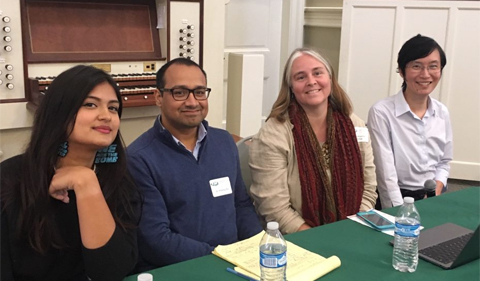by Kristin Distel
The Women’s, Gender & Sexuality Studies program welcomed back several of its alumni for the annual Reunion and Roundtables event, which featured a keynote address, several discussion panels, and a reception.
The day’s second panel, titled “Working for Transnational Gender Justice,” featured three OHIO alumni: Bobby Walker, Dr. Pronoy Rai, and Dr. Catherine Cutcher.
Cultural Sensitivity and Social Justice Initiatives
One of the main questions that the panel addressed was one of cultural sensitivity, including the ethics of cross-cultural labor and research.
“Current ways of organizing across borders present struggles,” Dr. Julie White noted. “As outsiders, we often have an impulse to take a homegrown version of social justice to other places in the world.”
“This requires deep self-reflection,” Cutcher explained.
“Transnational feminism requires us to move beyond the status of a detached outsider to someone who is deeply invested, someone who depends on relationships with other people to make change happen. Transnational feminism demands that we move beyond cultural relativism; it’s hard to enact change when we’re afraid of stepping on toes. We need to challenge cultural chauvinism and stereotypes, but we also need to be culturally humble,” Cutcher added.
Rai noted that the ethics of fieldwork are crucial to his research.
“I had to think about how to analyze my data, including working with respondents and asking questions that they don’t necessarily think about. How do I talk with female subjects in context in my fieldwork?” he stated.
“It’s hard to hire women in the field and women research assistants because of cultural assumptions about men and women working together. Yet, this is a process that we’re required to engage in if we are to produce knowledge. We need to consider issues of political challenges and political rigidity in countries in which we research and work,” he explained.
Helping People in Economic Precarity
Walker remarked that she is “interested in working on behalf of sex workers and trafficked persons, especially because of the large raids that occur in strip clubs.” She added that these types of targeted raids have been occurring internationally for a considerable amount of time.
“Many human rights groups target sex workers but hide behind a savior complex,” she emphasized.
“I’m interested in how people who have a uterus but don’t identify as women organize. We need to look at the ways that international groups organize, such as the repeal of restrictive abortion laws in Ireland. The needs of the working class must be the focus of international solidarity,” Walker added.
Cutcher, too, noted that building connections between one’s own experiences and the needs of others is key in developing transnational gender justice.
“I’m trying to see my position in Appalachia as connected to women’s struggles in other parts of the world. Many of the struggles are similar—some women don’t have access to jobs or cash, for example. Some economic issues are worldwide. I’m interested in connecting my work in Appalachian studies to people’s lives in other parts of the world,” she remarked.
A Broad Array of Experience
Walker (’07) holds degrees from OHIO in Women’s, Gender, and Sexuality Studies and African American Studies. She works for Ohio’s abortion fund, Women Have Options, where she coordinates financial assistance and transportation for patients who cannot afford an abortion or who travel out of state for services.
“I’ve assisted people with every step of the abortion process,” she states. “We’re trying to create a well-connected network of abortion providers.”
Rai (’13) holds an M.A. in International Development Studies from OHIO, and he earned a Ph.D. in Geography in 2018 from the University of Illinois. Rai is a tenure-track assistant professor of International and Global Studies at Portland State University in Oregon.
“My research examines gender and development in rural western India, farm workers who must move migrate to stitch together livelihood, feminist geography, and how masculinity is constructed and negotiated across space and time,” he explained. “Masculinity is malleable; it changes as the world changes. I’m interested in how homosociality has changed in Southeast Asia because it is a reflection of forms of globalization that have affected these countries, especially during 1990s,” he adds.
Cutcher (’00, ’13) is a two-time graduate of OHIO, holding an M.A. in International Affairs (African Studies) and a Ph.D. in Education (Cultural Studies) and a WGSS graduate certificate. Cutcher is the Assistant Director for Global Studies Programs in OHIO’s Center for International Studies. She has lived and researched in Kenya, Tanzania, and Switzerland.
“I studied abroad in Kenya as junior doing ethnographic work with street children, and I became interested in transnational gender justice early on as graduate student. I came to OHIO and learned about women’s studies, discovered my dissertation topic, and went back to Kenya for dissertation fieldwork, where I tried to understand how grassroots organizations operate in Kenya. It’s exciting to help students follow their fieldwork path and international path at my alma mater!” she remarked.




















Comments